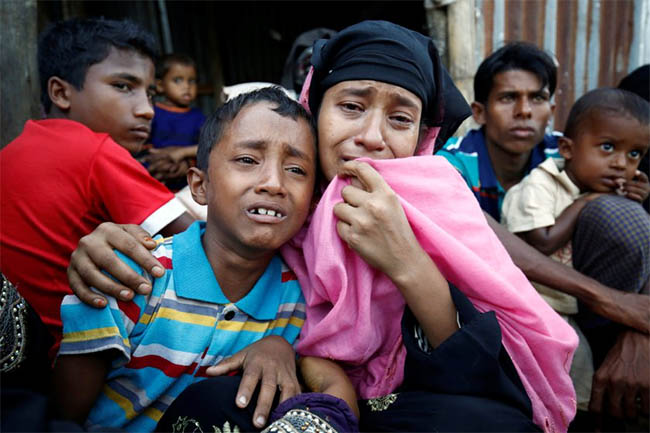The violation of Rohingya’s inherent rights and freedoms in Myanmar continues unabated and the poignant stories of women and children, who bear the brunt of violence, will outrage one’s conscience. Rohingya Muslims sustain great pain and heavy casualties in the wake of lethal acts of Myanmar security forces. The lurid reports about Rohingya, mainly the silence of Nobel Laureate Aung San Suu Kyi, have drawn international condemnation.
More than 507,000 Rohingya have fled to Bangladesh since Myanmar’s army launched a military crackdown on October 25, 2016 in response to what it claims was an attack by Rohingya armed men on border posts, in which nine police officers were killed. Those who fled violence and persecution in Myanmar have told stories of rape and other sexual abuse, indiscriminate killings and arson perpetrated by Myanmar security forces. Muslim minority, who live primarily in Rakhine State, is not recognized as an ethnic group in Myanmar; their freedoms are curtailed and their rights and dignity are trampled upon. The distraught octogenarian Rohingya women speak with tremulous voice regarding the derogatory acts and blatant carnage. Their children were killed and their houses were razed.
The UN Committee on the Elimination of Discrimination against Women (CEDAW) and the Committee on the Rights of a Child called on Myanmar authorities to stop violence forthwith in northern Rakhine. The committees said, “We are particularly worried about the fate of Rohingya women and children subject to serious violations of their human rights, including killings, rape and forced displacement.”
Similarly, the UN rights experts said, “Such violations may amount to crimes against humanity and we are deeply concerned at the state’s failure to put an end to these shocking human rights violations being committed at the behest of the military and other security forces, and of which women and children continue to bear the brunt.” The UN and other human rights organizations have warned that the mass exodus following killings, rapes, and burned villages are signs of “ethnic cleansing”, asking the international community to put pressure on Suu Kyi and her government to end the violence.
However, Myanmar repudiates the alleged ethnic cleansing. It says its security forces are fighting insurgents of the Arakan Rohingya Salvation Army. Likewise, the Nobel winner San Suu Kyi believes that the Rohingya Muslims are outsiders which prompted the world to call Suu to be stripped of her Nobel. She declaimed against the international aid groups and complained about “a huge iceberg of misinformation” aiming to help “the terrorists” — presumably meaning the Rohingya. When a hapless Rohingya woman recounted how her husband had been shot dead and how she and three teenage girls had been gang-raped by soldiers, Suu mocked the claims, on her Facebook page, as “fake rape.”
Discriminating an individual or a group on the basis of their racial, sexual, or religious backgrounds is against the international instruments. It is aptly stated in the preamble of the Universal Declaration of Human Rights (UDHR) that belittling human rights led to barbarous acts in human history, whereas respecting the inherent dignity and inalienable rights of mankind is the foundation of freedom, justice, and peace in the world.
To peruse the history or scrutinize the fact, violence and bloodshed stemmed from disparaging the rights and dignity of mankind and claiming racial or religious superiority out of megalomania. In other words, streams of blood were shed in the two World Wars in light of superiority claimed by one nation over another.
Notwithstanding the historical hemorrhage, the gory incidents continue around the human society. Ethnic minorities are still left at the mercy of bias and unfair treatment. The cycle of systematic killings and sectarian violence never stops. Violation of human rights is rife in many parts of the world. The rampant militancy and ethnic strife increased human fatalities to a great extent. The widespread violence is believed to root in lack of religious tolerance and racial acceptance. For instance, religious extremists spill the blood of people on the basis of their race, color, creed, etc. Similarly, the cruel practices of Myanmar Buddhist majority towards Rohingya Muslims are most likely to be out of discrimination and intolerance. Under the pretext of quelling the rioting or repulsing a terrorist attack, Myanmar security forces, who are indicted as war criminals, transcended not only international restrictions but also human code of ethics. No mercy is shown to civilians whose lugubrious stories are fraught with pain and anguish. Indeed, one will recoil with fear and disgust to see the vexatious rehearsals of Buddhist hate-mongers against the Rohingya Muslims, who might have been stereotyped acrimoniously as radicals. If the enormous havoc in Myanmar does not stop, it will generate manifold challenges in the region.
Home » Opinion » Indescribable Sufferings of the Rohingya
Indescribable Sufferings of the Rohingya
| Hujjatullah Zia

